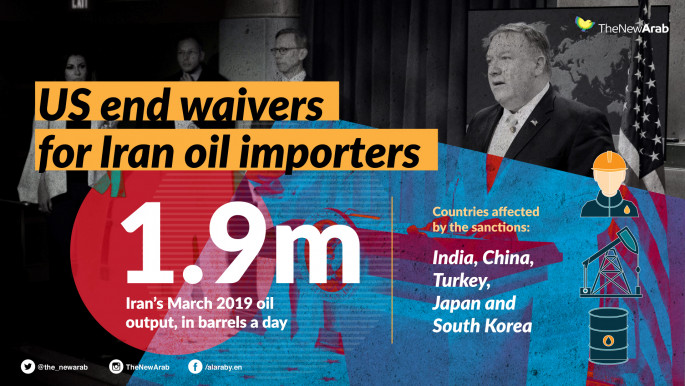Turkey unable to diversify oil imports following sanctions waiver withdrawal, minister says
Turkey will be unable to quickly diversify oil imports after the United States ended waivers exempting importers from sanctions on Iran, Turkey's foreign minister said on Thursday.
The US announced the end of the scheme last month, telling major buyers they would have to stop purchasing oil from Tehran by 1 May or face sanctions themselves.
The waiver scheme had allowed Iran's largest customers buy limited amounts of oil for the past six months.
"It does not seem possible for us to diversify the sources of the oil we import in a short time," Turkey's foreign minister Mevlut Cavusoglu told reporters, according to Reuters.
"We have to renew the technology of our refineries when we buy oil from third countries. That would mean the refineries remaining shut for some time. This, of course, has a cost."
While explaining that Ankara had already reduced its heavy reliance on its neighbour Tehran over the past year, Cavusoglu called on the US to review its decision.
Turkey said last week it was trying to negotiate with the US for oil refiner Tupras to be allowed to continue importing from Iran.
Turkey, which is near totally reliant on imports to meet its energy needs, imported almost half of its total oil requirements from Iran until May last year, when US President Donald Trump first hinted at sanctions.
Imports dropped to just 12 percent of Turkey’s needs within the four months following the imposition of sanctions in November, according to calculations made by Reuters.
China is the only other major buyer to have come forward and express a desire to continue purchasing Iranian oil.
The country opposed "long-armed jurisdictions implemented by the United States" and would continue "rational and legal" cooperation with Iran, it said last month.
Other major importers, such as India, Japan and South Korea, have signalled they would cease Iranian imports.
India said on Thursday it would deal with the impact of US sanctions by importing oil from other producers.
The US has put pressure on Gulf allies Saudi Arabia and the United Arab Emirates to increase oil production and exports in order to meet potential shortages.
Saudi Arabia has said it is willing and able to fill in the gap for global oil demand.
Russia, too, has hinted it would increase oil production levels to plug the gap following the expiry of an OPEC-mandated production limit in July.
Iran, however, has said it will continue importing despite pressure on its biggest buyers.
"America's decision that Iran's oil exports must reach zero is a wrong and mistaken decision, and we won't let this decision be executed and operational," President Hassan Rouhani said in a speech broadcasted live on state TV this week.
"In future months, the Americans themselves will see that we will continue our oil exports."


![Minnesota Tim Walz is working to court Muslim voters. [Getty]](/sites/default/files/styles/image_684x385/public/2169747529.jpeg?h=a5f2f23a&itok=b63Wif2V)




![Debris near Rafic Hariri International Airport [Getty]](/sites/default/files/styles/image_330x185/public/2176162423.jpeg?h=a5f2f23a&itok=MCSK9mkM)
![An Israeli air strike on Jabalia killed teenage journalist Hassan Hamad [Screengrab/X]](/sites/default/files/styles/image_330x185/public/2024-10/hassan%20hamad1.jpg?h=c12e0b96&itok=Rd_dyCVp)
